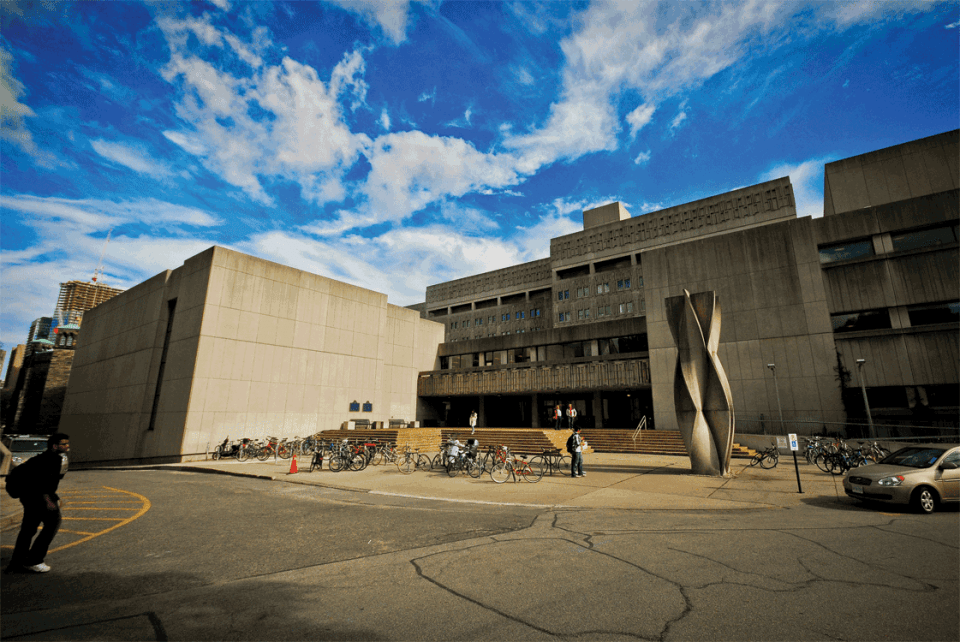On October 26, fifteen minutes before the end of a BIO230 midterm being administered in the Medical Sciences Building, a fire alarm went off. Carol*, along with roughly 250 of the 1,300 students taking the test, was evacuated. The test was being written in three separate rooms, only one of which was required to evacuate.
While everyone waited to re-enter the building and finish their tests, Carol says she saw some of her classmates discussing the midterm and checking their notes. “I witnessed students clustering with friends and discussing test questions. Other students stood outside the main entrance to Med-Sci, furiously reading through cue cards in the corners,” she says.
The Department of Cell and Systems Biology (CSB) has yet to articulate a clear response or resolution to the situation, which has raised significant questions surrounding academic dishonesty. “U of T has some of the strictest academic policies and they are refusing to accept the fact that this test is invalid for students who were still writing in Med-Sci, for both the positive and negative effects it could have had on their performance,” she says, adding that, “their reluctance to do anything about it completely contradicts what U of T stands for.”
A handful of students did not re-enter the building at all. According to Althea Blackburn-Evans, director of news & media relations at U of T, this was because they either had classes to attend, or were under the impression that they did not have to complete the test.
In an email sent to students, the department declined to make any accommodations for those who had their test disrupted by the alarms. “Unfortunately the fire alarms were out of our control… As a result, after extensive consultation and discussion, the Department of Cell and Systems Biology has determined that no adjustments will be made,” read a portion of the email. The message also informed students that the department had considered multiple options but that none were “feasible or fair” to all BIO230 students.
“The procedures for the disruption of exams are determined by the divisions; in this case, the registrar’s office in Arts & Science worked with the instructor to determine the course of action,” Blackburn-Evans wrote in an email to The Varsity.
Blackburn-Evans also said that students who did not return after the alarm were given the opportunity to write a make-up test; BIO230 students claimed otherwise.
“I don’t think any compensation has been offered; the [CSB department] has emailed numerous students back saying the situation was beyond their control,” said Arman, a second-year Neuroscience and Cell Systems Biology major, who was also writing the test when the alarm sounded. Carol also told The Varsity that no makeup exam was offered, and that Professor Harris, a BIO230 instructor, told her that no further action would be taken.
“I find it difficult to believe that the CSB department has ‘extensively consulted’ about this situation when marks were posted less than 48 hours after the test finished and it was decided that [they] were going to do nothing about the situation,” Carol said in response to the department’s email. “We should have the opportunity to write another test of similar difficulty in the proper test writing conditions. If I am not given this opportunity, I will not hesitate to approach higher bodies within U of T,” she added.
Tamanna Tasni also wrote the BIO230 midterm and had finished 25 of the 40 questions when the alarm went off. Tasani said that students were kept in the room for five minutes. “For [a] good five minutes TAs kept us inside the midterm room which made me think I was going to die in there for education,” she said.
Tasni said that, after waiting outside in the cold for 20 minutes, she could not concentrate. Although she thought she did well on the test, she got her marks back and most of her mistakes were after the twenty-fifth question. “Many people complained about this to the profs yet no one seemed to care just because we got to write the test for the same amount of time as others,” she said.
Although Arman wrote the test in the Mecical Sciences Building, he had already finished by the time the fire alarm went off. He found out about the disruption later on Facebook.
“How can the [CSB department] do anything about the situation anyway? The fire alarm was beyond their control, and there is no way to prove which students cheated,” he said. “If there was anything that the [CSB department] could have done, it’s that they could have reacted quicker to the situation and perhaps looked specifically at which TAs were supervising those rooms. If they reacted quicker and looked into the TAs involved, maybe they would have been able to catch the students cheating.”
“[There] need to be new protocols on what to do when an alarm or something similar disrupts an exam,” Arman suggested.
Arman had a different opinion about the effects of the disruption, “Whether or not someone else (or a group of people) cheated, does not affect my ability or my outcome of the test. Plus, the mean for the test was 62 per cent anyway, very low, so it doesn’t look like the cheating actually affected the mark distribution at all.”
* Name changed at student’s request


